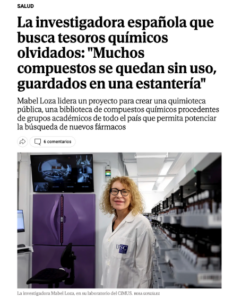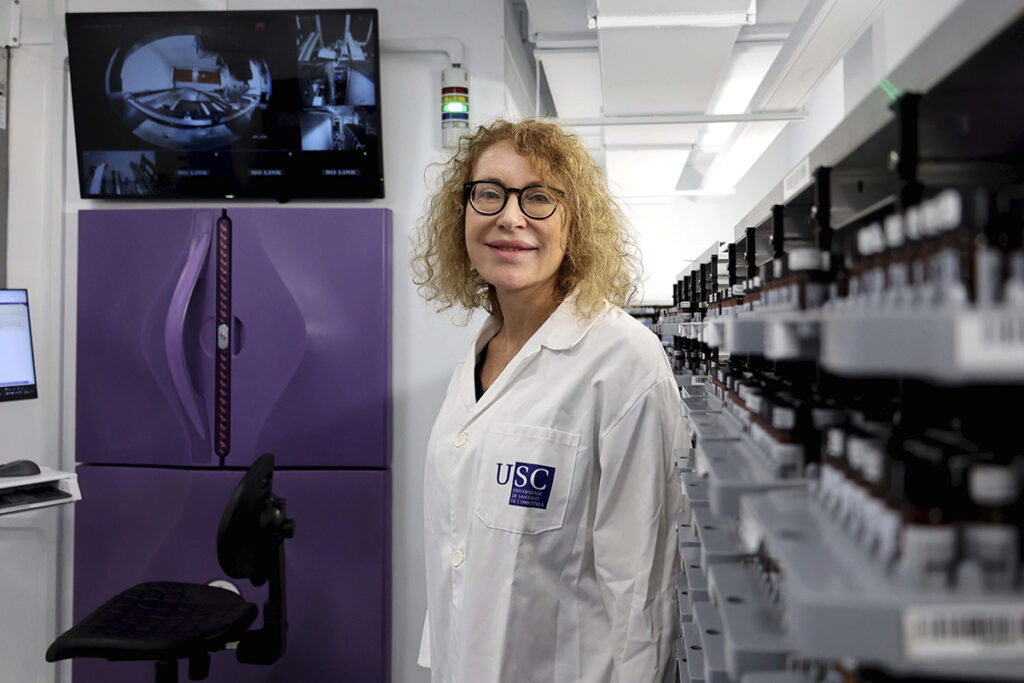A few weeks ago, the newspaper El Mundo highlighted the progress of the Complementary Plan for Biotechnology Applied to Health in Galicia in an interview with Mabel Loza, coordinator of the program in Galicia. In the interview, published in its science and health section, Mabel detailed the main lines of the project to create a Spanish public chemolibrary.
Mabel Loza is one of the main figures behind the promotion of biotechnology in Galicia. During the interview, she stressed that the aim of the project is to value and take advantage of chemical compounds forgotten in academic laboratories that could be key to developing new medical treatments. Many of these compounds, created for various purposes in different research projects, are gathering dust on shelves without being used. The chemolibrary will make it possible to standardize, catalog and test these molecules, speeding up research into new drugs and potentially saving lives.
This is a joint initiative of the Complementary Plan for Biotechnology Applied to Health (PCBAS) and the Synergies Strategic Network for Early Drug Discovery in Spain.

TAPPING NEGLECTED RESOURCES
But Mabel stresses that this is not a project that starts from scratch. Many laboratories have already identified key biochemical pathways and target molecules to treat diseases such as metabolic or neurodegenerative disorders. However, “arrows”, i.e. effective treatments, are lacking. The chemo library proposes to take advantage of existing, stored and unused molecules and subject them to assays on screening platforms that could reveal their efficacy. This would reduce the duration of research processes, since already synthesized compounds would be used.
The initiative, driven by the Kaertor Foundation and coordinated by Mabel, seeks to expand the “chemical space” of molecules available for testing in drug screening campaigns through the collaboration of academic groups across the country. The chemolibrary seeks to expand the structural diversity of molecules, crucial for increasing the chances of success in new drug research. “We want the possibilities of these molecules to be able to be studied and exploited,” says Mabel, stressing the importance of recovering these compounds to discover new medical treatments.
GALICIA, A PROMISING FUTURE
The Spanish public chemolibrary is currently in a pilot phase, but aims to collect 20,000 compounds through a dynamic process that will expand over time. Mabel and her team believe that this initiative will position Spain in a prominent position in global drug discovery, enabling synergies between academic groups and companies, and speeding up the transition between basic research and clinical application.
The presentation of this initiative will take place at several scientific congresses, such as the XVI Meeting of the Spanish Drug Discovery Network, which will take place in Valencia from November 13 to 15; the XX Symposium of Young Researchers of the RSEQ, in Ciudad Real from November 18 to 21; and the Drug Discovery Chemistry Europe, in Barcelona from December 3 to 5. In addition, workshops will be organized in the different autonomous communities that are part of the project, including Galicia, Andalusia, Valencia, Madrid, Catalonia, Extremadura, Aragon, the Basque Country and Castilla-La Mancha.
This project could be a decisive step towards closing the gap between scientific research and the development of treatments for patients, taking advantage of the unused potential that lies forgotten in laboratories across the country.
Read he full interview here




